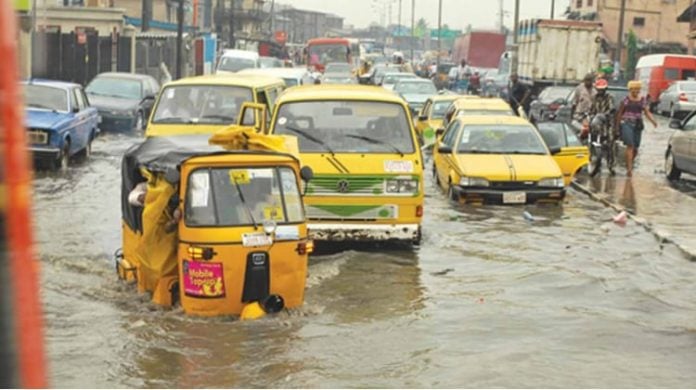Heavy rainfall in Lagos State on Wednesday resulted in significant disruptions, bringing traffic and business activities in several communities to a virtual standstill. As the city grappled with hours of relentless downpour, flash floods surged through key neighbourhoods including Maryland, Lekki, Ogba, and Ikorodu, highlighting once again the acute vulnerability of Africa’s most populous city to flooding.
The aftermath of the storm was grim for many residents and local business owners, several of whom faced extensive flooding in their homes and shops. According to eyewitness reports and accounts circulating on social media, streets typically bustling with activity were transformed into virtual rivers, as people were seen wading through knee-deep water to reach their destinations. Motorists navigated the swamped roads at a snail’s pace, some eventually stalling as engine compartments succumbed to the high water levels.
In Maryland, the situation was particularly dire on Olatunji Street, where a nearby canal overflowed and severed access between the main road and the adjacent Mende community. One long-term Maryland resident, Chinasa Nnadi, described the persistent nature of such floods, recounting, “This has been happening for years now. Whenever it rains, it becomes nearly impossible for vehicles to go in or out, and sometimes people even swim to get to their houses. It’s gotten so bad that some have had no choice but to relocate.”
For some, the water inundated not only their homes but also threatened their livelihoods. “I watched people trying desperately to scoop water out of their homes once the flood entered—my shop was also affected,” lamented another shop owner in Maryland.
Churches and communal spaces were not spared by the flood’s reach. Christiana, a member of a local church, described significant losses: “The flood destroyed several of our musical instruments. We’ll have to spend a lot to either repair or replace them. Every time the canal is full, water finds its way into the church and causes devastating damage.”
Widespread flooding produced severe gridlock across major roads. According to regular commuters, traffic was compounded as vehicles repeatedly broke down on submerged roads like the notorious Ogba-Wempco junction. “Everyone knows movement is almost impossible there during the rainy season,” said a driver, Tunji Abass. “Yesterday, it was worse than usual—I spent hours just getting through one flooded stretch. Sometimes, the water gets into cars, making it even more difficult. Government intervention can’t come soon enough.”
Those working in areas such as Ikate shared stories of adaptation. Victor Obinna, based in Ikate, revealed that he now sometimes sleeps in the office to avoid the stress brought by heavy rains. “The road to my office floods heavily. Some mornings, I have to walk through water before I even get to the office, and by then, I’m already soaked,” he explained.
Flash flooding is not a new ordeal for Lagosians. Only a few weeks prior, property reportedly worth millions of naira was destroyed during another flood incident in Ikorodu, underlining the recurring nature of the threat. Videos surfacing online frequently provide stark visuals of urban communities submerged after intense rainfalls.
Beyond property loss and business disruption, the Nigerian Meteorological Agency (NiMET) has previously warned about the economic and public health risks tied to recurrent flooding in Lagos. Each year, the flooding leads to damages estimated in the billions of naira, with knock-on effects including destruction of cars and homes, loss of productive work hours due to gridlock, and outbreaks of waterborne diseases as standing water lingers in affected areas.
Following the latest incident, the Lagos State Government issued a statement expressing sympathy with those affected. Environmental and Water Resources Commissioner, Tokunbo Wahab, acknowledged the city’s exposure to flooding due to its coastal geography, especially during periods of intense rain and tidal lock. He further assured residents that the government was ramping up investments in drainage systems, regular de-silting of waterways, and stricter enforcement of environmental laws to mitigate the problem.
Addressing specific points within the city, Wahab noted that the floods around Lekki’s Kusenla axis stemmed from a technical hitch: “In this area, the downstream is actually higher than the current drainage network. However, plans are underway to construct a pumping station to address this gap.”
He also highlighted preventable causes in other locations. For example, the flooding near House on the Rock church was partly the result of illegal construction on floodplains and improper refuse disposal, which exacerbate blockages and reduce the water-carrying capacity of existing drains. “Clear infractions were observed in some of the recent videos. The state will not hesitate to remove illegal structures and reclaim land where necessary in order to restore effective drainage,” Wahab said in the official statement.
The government appealed to Lagosians for continued cooperation, reiterating the critical role that responsible environmental behavior plays in fighting floods—from regular drain cleaning to proper waste disposal and adherence to laws preventing construction in drainage paths. “This recent flooding was a flash event and has largely subsided,” Wahab concluded, “but tackling floods in a city like Lagos requires collective action if we are to achieve a more resilient, flood-free future.”
Environmental experts point out that large-scale solutions will require not just government willpower but sustainable urban planning and proactive citizen participation. Dr. Olumide Adeola, a Lagos-based urban planner, explained that, “What we’re witnessing is the inevitable outcome of decades of unplanned urban expansion, combined with inadequate public infrastructure investment. For coastal West African cities, Lagos is a warning and a learning laboratory—other cities in the region should take note.”
Elsewhere in West Africa, cities like Accra in Ghana and Abidjan in Côte d’Ivoire have also faced similar flooding crises recently. Lessons learned in Lagos can guide approaches to drainage, waste management, and urban resilience across the region and even globally as climate change increases the intensity and unpredictability of weather events.
Ultimately, the real test for Lagos is not how quickly the waters recede, but whether sustainable partnerships, investment in resilient infrastructure, and robust enforcement can stem the tide of future floods. For the millions who call the metropolis home, the issue is far from abstract—it strikes at their safety, livelihood, and hope for a better urban future.
What are your experiences with flooding in your area, and what practical steps do you think should be prioritized to prevent recurrence? Drop a comment below and join the conversation—your voice matters in shaping a safer Lagos and West Africa.
For general support or to discuss collaborations, reach us at support@nowahalazone.com.
Stay up-to-date and join our local community—follow us on Facebook, X (Twitter), and Instagram for the latest updates, stories, and more!










